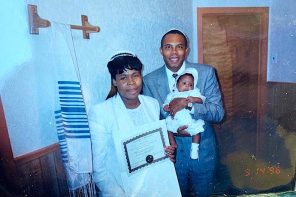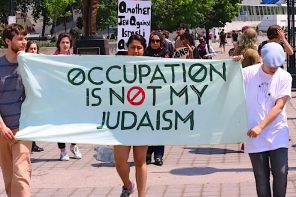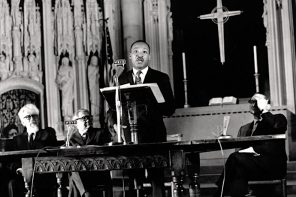Among the reliable pleasures of teaching religion at a progressive institution like the Graduate Theological Union is the regular discovery of the similarities and overlap between religions: the Easter Egg showing up on the Passover table (or is the other way around?), Ishmael on Abraham’s altar, the nothing as fountainhead of Buddhist and Jewish mysticism. Even the December dilemma is not without its opportunities to meditate on the power of light in the shared winter darkness, descending on all of us equally.
This Friday, though, is not one of those occasions for happy resonances, or put otherwise, narcissistic affirmation. The vagaries of the Jewish lunar (lunatic?) calendar, in combination with the more familiar plod of the solar one, have produced a rather awkward confluence of religious commemorations in Purim and Good Friday. In synagogues around the country, Jews are dressed up in fright wigs, booing Haman’s mention in the Book of Esther while drinking Slivovitz and vodka. My son’s Jewish day school will be turned into a carnival, with rides and cotton candy and tanks for dunking teachers. In churches (or so I hear, anyway), they’re reading the book of John and mourning the crucifixion of Jesus Christ. Will some Christian leaving church heavyhearted after the sermon hear the shrieks of Jewish children in the bouncy castle? What will they think? Should we keep it down?
But surely this has happened before, the solar and lunar gears clicking into place in just this way. The potential for misunderstanding, and the ramifications of such misunderstanding must have been huge in earlier periods. I imagine a Purim celebration of the 13th or 14th century moving into basements, the noisemakers muffled, the revelry masked. But was it entirely a misunderstanding to believe that Jews were celebrating the crucifixion? My medievalist colleague tells me that the villainous figure of Haman was understood by European Jews in the Middle Ages as Jesus, the apparent cause of Jewish misery in Christendom. Purim is, among other things, the performed rejection (if only for a day) of Jewish victimization, a violent fantasy of Jewish empowerment—it was no coincidence that Baruch Goldstein’s murderous rampage took place on Purim. In this way, John and Esther, Purim and Good Friday, do in fact speak to each other, but not pleasantly, not easily, not as part of a shared vision but a fraught past.
But Purim, something in me protests, has nothing to do with the pieties and solemnities of “Jewish-Christian dialogue.” This is a Jewish holiday, with no real counterpart in the Christian calendar, and with a peculiarly Jewish irreverence at its core. This is the holiday, for heaven’s sake, where the loathed anti-Semite is turned into a cookie! (Well yes, sort of like the Eucharist, but much funnier.) That this holiday should be “falling on” (what a choice of words) the gloomiest of Christian holy days is just an unfortunate coincidence. Let it be said: we’re not laughing about you. At least I don’t think so.
Before I taught at the GTU, my main encounter with priests and ministers was in jokes, where they shared the stage with a rabbi. I love knowing priests, and they’re usually happy to know me, too. It comes in handy, from time to time—for instance a few weeks ago, when a priest I’d met at a conference on Holy Hill asked me whether I might consider helping him out in a little matter. His church had decided to change one feature of their traditional Maundy Thursday (or Erev Good Friday, as I thought of it) “washing of the feet” ceremony, so that it was Jewish feet they were washing. They were looking for all kinds of Jews, including children, who would like to have their feet washed, or at least wouldn’t mind it. Would I consider it, and find some other Jews, too? It’s good that the request came via email, so he couldn’t hear my whoop of glee.
My husband, less versed in the strange ways of the post-Holocaust, progressive Jewish-Christian encounter, asked, “Is this about atoning for anti-Jewish persecution?” “Well, yeah, I guess. What did you think it was about?”
He puzzled out loud. “Foot washing. I mean, there’s been a lot of persecution. Don’t you think they should throw in a foot massage? A pedicure? It’s been a very stressful millennium.”
Okay, I’ll admit it. The merriment went on for days, much of it even less printable than what I’ve conveyed here. I considered sending out the request to our Jewish Studies list, with the poker-faced subject line “Foot-Washing Opportunity.” But when I backed out of the opportunity myself, on the impregnable excuse of having my own holiday to celebrate, my priest friend ruefully responded that he had withdrawn the invitation after it became clear to him that all the Jews he knew could hardly keep a straight face at the mere thought of removing their shoes and socks for the sake of Christian penitence. And while such open hilarity was the order of the day in the synagogue, it was clearly out of line at church, at least on Maundy Thursday. And so, on this vernal equinox, at precisely the moment when day and night stand in perfect harmony, Jews and Christians will be going their own merry or mournful ways. Is that something we should mourn or celebrate? It depends who you ask.




